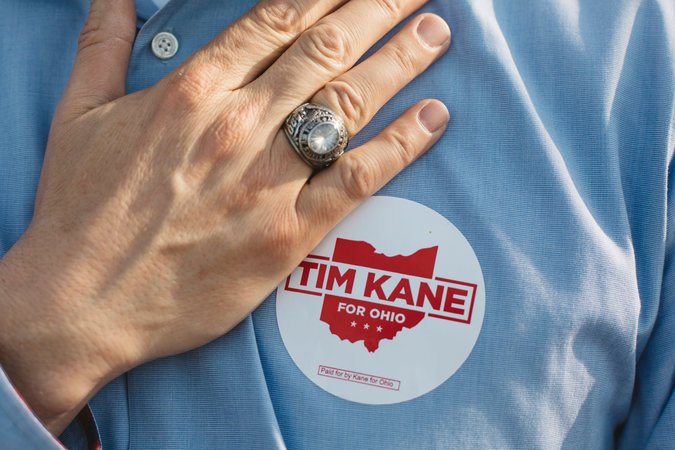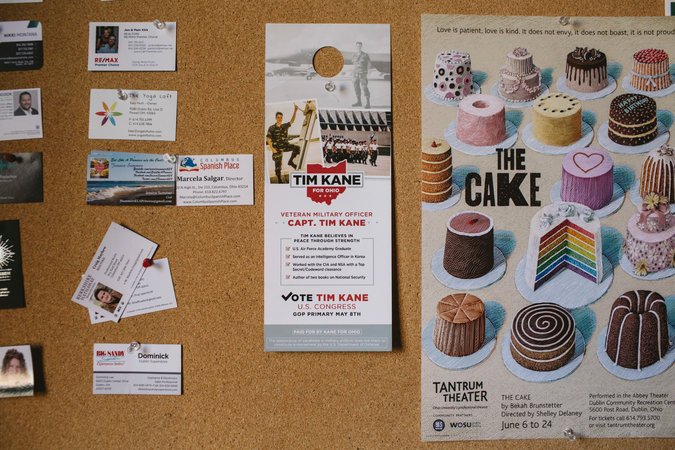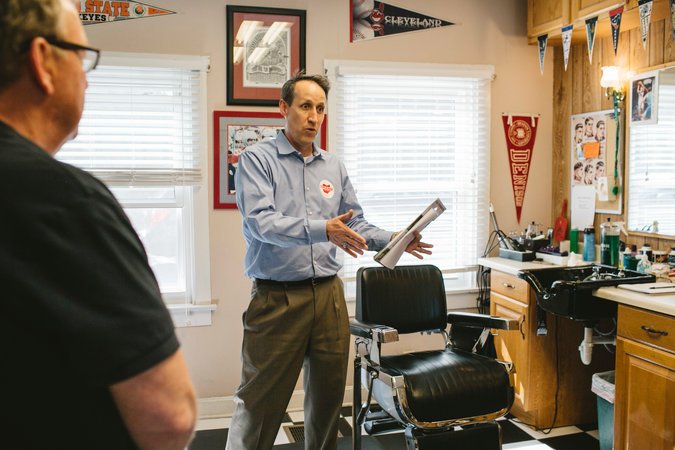On the campaign trail, Mr. Kane adapts a refrain from Howard Dean’s 2004 presidential run, saying that he is “from the Republican wing of the Republican Party.” Tuesday’s primary is, on one level, a test of whether that is true — whether a candidate with economic policy positions that are conservative but not populist can win in Ohio in 2018.
“Even within the Republican Party, it’s a referendum on Trump and whether those traditional conservative Republicans can reclaim control of the party,” said Rita Kipp, head of the League of Women Voters of Licking County, one of seven counties in this sprawling district outside Columbus.
Indeed, surveys show that Republican voters — who were once more supportive than Democrats of free-trade agreements — have turned sharply against such deals in recent years. Last year the Pew Research Center found that just 36 percent of Republicans thought free trade had been a good thing for the United States, down from 57 percent in 2009.
The gulf between economists and the public is particularly vast. In 2016, when a University of Chicago survey asked more than three dozen prominent economists whether workers in Ohio and Michigan would have been better off if the United States had been tougher in trade negotiations, almost none said yes. But when the online polling firm SurveyMonkey asked the same question of the general public last month on behalf of The New York Times, 59 percent of adults — and 84 percent of Republicans — said the United States should have been tougher.
Douglas Holtz-Eakin, an economist and president of the American Action Forum, a conservative group, said those results were hardly surprising. Trade has never been an easy sell to the public, he said, because the costs, in shuttered plants and lost jobs, are large and obvious, while the benefits — lower consumer prices and greater productivity — are diffuse and hard to see.
“You have to make the case on a regular basis that the benefits are greater than the costs,” Mr. Holtz-Eakin said.
Mr. Holtz-Eakin, who has endorsed Mr. Kane, said the Republican Party needed candidates who would make the case for policies that are more popular with economists than with the general public, among them immigration, fiscal restraint and trade.
Advertisement
Continue reading the main story
“Campaigns are teachable moments in the United States,” Mr. Holtz-Eakin said.
If any district in Ohio is likely to be receptive to Mr. Kane’s economics lessons, it is the 12th. The district — which went for Mr. Trump by about 10 points in 2016 — includes rural areas, but the bulk of the population lives in relatively affluent, educated Columbus suburbs that have largely escaped the postindustrial decline that has afflicted Youngstown, Dayton and other cities. Dublin, where Mr. Kane moved late last year, is one of the state’s wealthiest cities, with a median household income of more than $125,000.
Campaigning on a recent Monday, Mr. Kane did not try to run away from his more contentious positions, or from his wonkish résumé. At a meet-and-greet with voters at a French bakery in Dublin’s quaint downtown, Mr. Kane broke the ice with stories about his days at the Air Force Academy, but quickly pivoted to citing articles he had written promoting free trade and entrepreneurship.
Even on friendly turf, however, Mr. Kane faced some skepticism. When one attendee, Caroline Lahrmann, asked about immigration, Mr. Kane noted that he had written 20 articles and was working on a book about the subject. Then he moved into an intricate discussion of immigration policy: why immigration is important for the economy and why he supports work permits, but not a pathway to citizenship, for people in the country illegally.
Eventually, Ms. Lahrmann broke in.


“I haven’t heard how he’s going to address illegal immigration yet,” she said. “How are you going to stop the illegal immigration?”
Mr. Kane said he was not necessarily opposed to a border wall, but he doubted it would do much good. Melissa Stack, a local nurse, cut him off. “I disagree with you that the wall doesn’t work,” she said.
Speaking after the event, Ms. Lahrmann said she had liked Mr. Kane, but had not been convinced by his answers on immigration. She also questioned his stand on trade.
Newsletter Sign Up
Continue reading the main story
Thank you for subscribing.
An error has occurred. Please try again later.
You are already subscribed to this email.
“It sounds great, free trade,” she said, noting that she had studied economics in college. But, she said, “you have to play tough sometimes” — something she said Mr. Trump understood.
Mr. Trump will not be on the ballot on Tuesday, but he is a constant presence in the race. Most of Mr. Kane’s rivals for the Republican nomination have embraced Mr. Trump, promising to support his agenda. Melanie Leneghan, who has the backing of several members of the conservative House Freedom Caucus, pledges on her campaign website that she “will stand with our president every step of the way.”
Mr. Kane is more circumspect. He initially supported Jeb Bush in the 2016 election, and signed a letter opposing Mr. Trump during the primary campaign. But in an interview last week, he praised Mr. Trump’s approach to foreign policy and said he believed that the president would ultimately side with the pro-trade faction of his administration.
Advertisement
Continue reading the main story
“I’m trying to help the president be successful,” Mr. Kane said. “I do think the president is a man who listens.”
Mr. Kane’s opponents paint him as a Washington insider and a carpetbagger. Mr. Kane grew up in Columbus but until last year had not lived in the area since high school; he was a resident of Virginia when Mr. Tiberi announced his retirement.
“He doesn’t live here and never has,” Ms. Leneghan said. “He’s a Washington insider.”

But Mr. Kane is serious about winning. He has lent his campaign $244,000 of his own money and received donations of more than $200,000. Two other candidates in the race — Ms. Leneghan and Troy Balderson, a state senator whom Mr. Tiberi has endorsed for his old seat — have each raised a similar total. A county prosecutor, Carol O’Brien, and another state senator, Kevin Bacon, have also raised and spent substantial amounts.
Several national “super PACs” have also entered the fray, running ads and sending mailings for and against the leading candidates.
Since Mr. Trump’s election, Republican candidates have struggled in special elections, especially in suburban districts like this one. Democrats are fielding several strong candidates of their own, and the Cook Political Report recently rated the race a tossup.
In an unusual twist, this primary is actually two elections in one. Voters will get to choose nominees both for a special election to replace Mr. Tiberi, which will be held in August, and for the general election in November.
There has been no independent polling, and local political experts say that with turnout expected to be low, Tuesday’s outcome is anyone’s guess.
In the meantime, Mr. Kane is out knocking on doors, making his case to anyone willing to listen.
Campaigning in Dublin, Mr. Kane spied a man in a Navy hat walking his dog. After chatting briefly about military service, the man told Mr. Kane that what he really wanted was for Congress to balance the budget.
Mr. Kane’s campaign manager, standing a few feet away, smiled, knowing what was coming next.
As a matter of fact, Mr. Kane said, “I wrote a book on that.”
Continue reading the main story
Article source: https://www.nytimes.com/2018/05/06/business/economy/house-ohio-trade.html?partner=rss&emc=rss
Speak Your Mind
You must be logged in to post a comment.